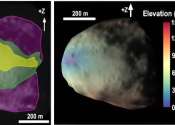Retirement as we know it is ending—it's time to rethink the idea of working age
When do you think you'll retire? Aged 65? Younger, if you're lucky? Maybe older if you're unlucky—or if you're young right now?

When do you think you'll retire? Aged 65? Younger, if you're lucky? Maybe older if you're unlucky—or if you're young right now?
Social Sciences
Jul 31, 2024
0
29

One of NASA's key priorities is understanding the potential for life elsewhere in the universe. NASA has not found any credible evidence of extraterrestrial life—but NASA is exploring the solar system and beyond to help ...
Astrobiology
Aug 2, 2024
5
182

By diving into the sun's corona, NASA's Parker Solar Probe has ruled out S-shaped bends in the sun's magnetic field as a cause of the corona's searing temperatures, according to University of Michigan research published in ...
Astronomy
Jul 30, 2024
1
260

Sealed inside a habitat in Texas and cut off from the outside world for over a year, Kelly Haston was the commander of a first-of-its-kind simulation for NASA to prepare for a future mission to Mars.
Space Exploration
Jul 31, 2024
2
28

Using the MeerKAT radio telescope, astronomers have observed eclipses in the radio emission of a pulsar known as PSR J0024−7204O. Results of the observational campaign, published on the preprint server arXiv, could help ...

In studying data collected from NASA's DART (Double Asteroid Redirection Test) mission, which in 2022 sent a spacecraft to intentionally collide with the asteroid moonlet Dimorphos, the mission's science team has discovered ...
Astronomy
Jul 30, 2024
0
179

Interest in interstellar objects (ISOs) was ignited in 2017 when 'Oumuamua flew through our solar system and made a flyby of Earth. Roughly two years later, another ISO passed through our solar system—the interstellar comet ...
Planetary Sciences
Aug 1, 2024
0
33

Scientists from across academic disciplines are extremely concerned about climate change. Many of them have already changed their own lifestyles or engaged in advocacy and protest, with even more being willing to do so in ...
Environment
Aug 5, 2024
1
91

How do we measure chaos and why would we want to? Together, Penn engineers Dani S. Bassett, J. Peter Skirkanich Professor in Bioengineering and in Electrical and Systems Engineering, and postdoctoral researcher Kieran Murphy ...
General Physics
Jul 30, 2024
0
98

Aerosol particles are tiny. Swirling suspended in the air around us, most are smaller than the smallest bug, thinner than the thinnest hair on your head, gossamer specks practically invisible to the naked eye. Newly formed ...
Earth Sciences
Aug 3, 2024
1
61
System (from Latin systēma, in turn from Greek σύστημα systēma) is a set of interacting or interdependent entities forming an integrated whole.
The concept of an 'integrated whole' can also be stated in terms of a system embodying a set of relationships which are differentiated from relationships of the set to other elements, and from relationships between an element of the set and elements not a part of the relational regime.
The scientific research field which is engaged in the study of the general properties of systems include systems theory, systems science, systemics and systems engineering. They investigate the abstract properties of the matter and organization, searching concepts and principles which are independent of the specific domain, substance, type, or temporal scales of existence.
Most systems share common characteristics, including:
The term system may also refer to a set of rules that governs behavior or structure.
This text uses material from Wikipedia, licensed under CC BY-SA